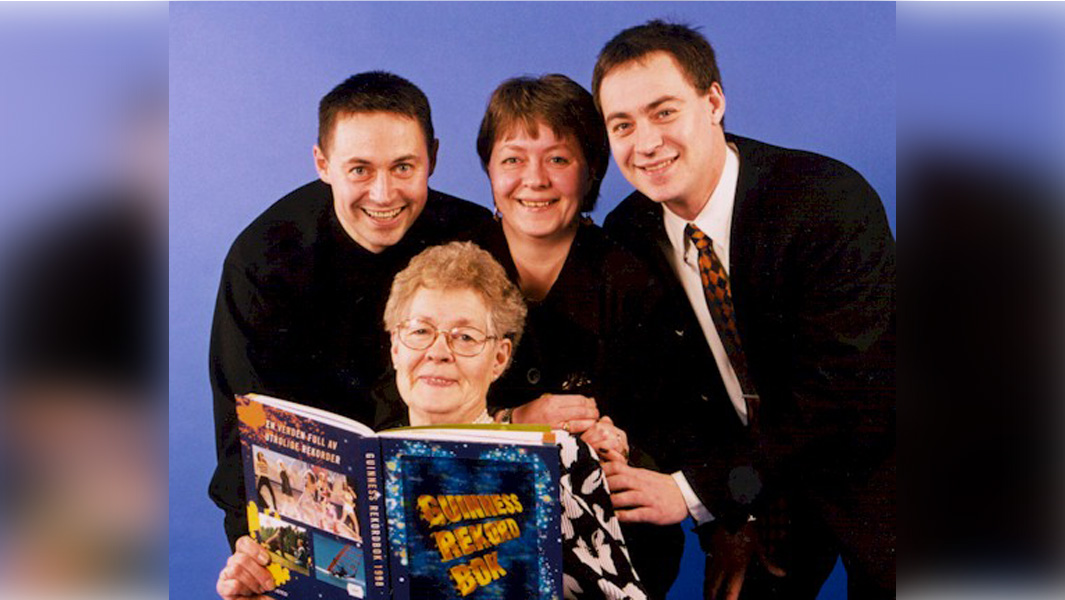Meet the Leap Day family from Norway who only get a real birthday every four years

It’s a million-dollar question: when do people born on a Leap Day celebrate their birthdays?
That’s a good question for the three children of Karin and Henry Henriksen – an apparently ordinary family from Andenes, Norway.
The three siblings Heidi (b. 1960), Olav (1964) and Leif-Martin (1968) all share a peculiar trait: they celebrate their birthdays infrequently, on 29 February. They were born on consequent bissextile years, becoming the most siblings born on a Leap Day in history.
The record was first added to the Guinness World Records book in 1980 and, ever since, the Henriksens have been often featured in interviews in and out of Norway.
Sometimes, the siblings report, friends don’t believe their record.

“It’s probably a bit more special for others than for us,” said the youngest sibling, Leif-Martin, to Vol.No. “I think that has something to do with the fact that we didn’t contribute directly to the records ourselves.”
As the family confirmed, all the births were natural: Karin Henriksen didn’t give birth through a caesarean section, and none of the labours were induced. Just an amazing, record-breaking coincidence!
According to the Honor Society of Leap Year Day Babies, there are “a total of 1,461 days in each four years, so the probability that a person is born on 29 February is one in 1,461”.
If a year is divisible by 100 then it is a Leap Year only if it is also divisible by 400, so between the years 2097 and 2103, your chance of being born on Leap Day is zero. - Honor Society of Leap Year Day Babies
A similar coincidence occurred for the curious record of the most generations born on Leap Day.
Three generations of the Keogh family, a British family originally from Ireland, celebrate their birthdays on a Leap Year.
Although being born on a Leap Day is not a too infrequent occasion in itself, grandfather Peter Anthony (Ireland), his son Eric (UK, born 24 years later) and Anthony’s grand-daughter Bethany Wealth (UK) all share the same birthday.
Born respectively in 1940, 1964 and 1996, the Keoghs represent the only verified case in history of a family repeatedly celebrating births on 29 February through different generations.
At Guinness World Records, we see amazing feats being achieved every day all around the world. Very few records, however, are celebrated once every four years.
That’s the case, for example, of the first posthumous Oscar.
During the ceremony of the 1939 Academy Awards, on 29 February 1940, the American screenwriter Sidney Howard was honoured with the golden statue for his work on Gone With The Wind (1939).
Howard had already received the Pulitzer Prize for Drama in 1925 and two Oscar nominations (1932 and 1936).
Sadly, he passed the year before he could receive his accolade and celebrate the astounding success of Gone With The Wind, based on the novel of the same name, which would grow into an all-time classic.
The screenwriter had been crushed by a tractor in a tragic farm accident in August 1939, at the age of 48.
Canadian ice hockey goaltender Gilles Gilbert, who sadly passed in 2023, won 17 games in a row under the banner of the Boston Bruins (USA), smashing the record for longest winning streak by an NHL goaltender.
The goaltender didn't lose a single match between 26 December 1975 and 29 February 1976.
Leap Years were first introduced during ancient Rome, under Julius Caesar, recognizing the issue and improving the Julian calendar.
A Leap Year contains an additional day, the 366th day, to keep the calendar year synchronized with the astronomical and seasonal year. The additional 24 hours are added every four years because of a "mismatch between the calendar year and Earth’s orbit."
That happens because the Earth's orbit around the sun doesn't take exactly 365 days - therefore, those additional six hours are added in the Leap Day (collecting six extra hours every year, which equals to an extra 24 hours every four years).
Many countries flaunt curious traditions to celebrate this occurrence, and some believe that a Leap Year will bring forth unpredictable weather or bad luck.
If you love watching records being broken you should check out our Records Weekly series on YouTube...
Want more? Follow us on Google News and across our social media channels to stay up-to-date with all things Guinness World Records! You can find us on Facebook, Twitter/X, Instagram, Threads, TikTok, LinkedIn, and Snapchat Discover.
Don't forget to check out our videos on YouTube and become part of our group chat by following the Guinness World Records WhatsApp channel.
Still not had enough? Click here to buy our latest book, filled to the brim with stories about our amazing record breakers.


